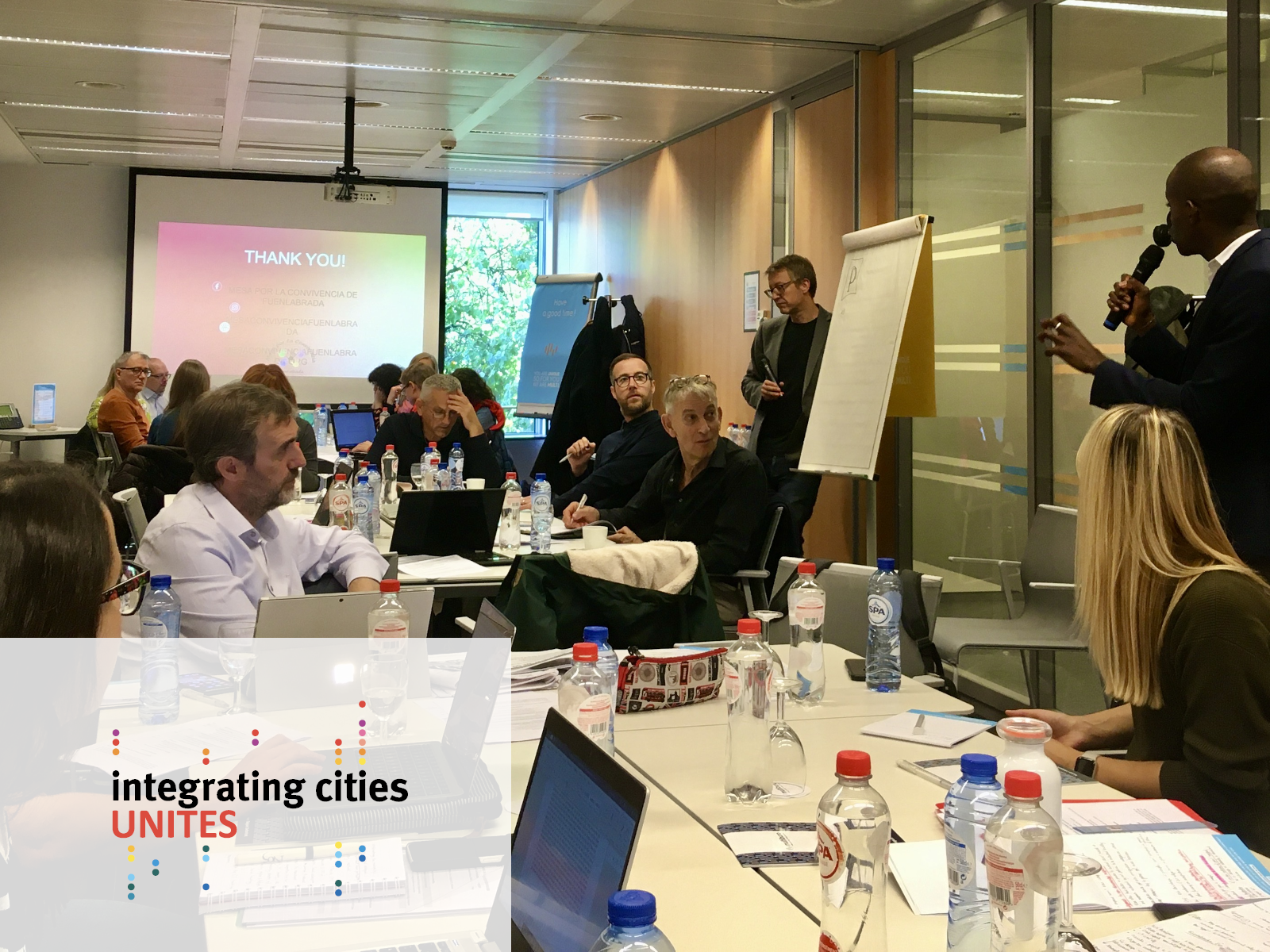
Since the beginning of 2022, UNITEE is part of the EU-funded UNITES project – “UrbaN InTEgration Strategies through co-design”. Led by Eurocities in cooperation with UNITEE, MigrationWork, and New Women Connectors, UNITES trains the eight European cities participating in the project to co-design integration policies with other local stakeholders and migrants.
Based on existing best practices of co-design strategies used by other cities worldwide, UNITES is developing training material which will be tested in the participating cities Athens, Bologna, Düsseldorf, Grenoble, Oulu, Prague, Zagreb, and Zaragoza. As UNITES partners, these cities will receive outreach grants, allowing them to implement some of the co-design best practices identified throughout the project. The training materials will be published at the end of the three-year project, allowing further cities to benefit from the outcomes and insights.
Kicking off at the beginning of 2022, UNITES has already identified six cities to inspire the UNITES partners with their approaches to co-design and the participation of migrants and refugees in integration policies: São Paulo, Nuremberg, Nantes, Liverpool, Fuenlabrada, and Mörsil.
The best practices of these six cities in co-design of integration policies were shared with the 8 UNITES cities for a training event in September 2022.
The importance of co-design
The event included an insightful introduction to co-design through which migrants and their experience are valued as experts in the policy-making process. To this end, co-design can break down the traditional, hierarchical approach to policy-making: instead of the local authorities making policies for migrants, the process is a collaboration between the two, allowing for better, more effective outcomes. Such a participatory approach is still not very common in the area of integration, despite considerable gains that were illustrated and discussed during the training.
Co-designing integration policies can be a complex but rewarding task. Newcomer migrants and refugees are usually not citizens in their country of residence, barring them from political participation such as voting. Undocumented migrants are even harder to account for and include in co-design processes.
Such exclusions need to be compensated for by creating accessible and safe spaces with inclusive communication that can make all people feel welcome and heard.
This presents another challenge: reaching a diverse group and being inclusive to all. Migrants and refugees come from different cultural backgrounds, they all have different stories and daily challenges. Cities and municipalities need good data about their migrant and refugee populations to understand how to be more inclusive and how to accommodate everyone. However, as some migrants are not present in the data the question arises how they can be accounted for in the policy-making process and encouraged to voice their opinions.
When cities recognise that they are limited in their approach to inclusion and participation of newcomers, they need to be prepared to make changes. They might set up consultative bodies or integration councils, but these solutions have their limitations: true representation beyond tokenism and consultation, and transparency being key challenges.
Lastly, transitioning to inclusive decision-making and co-design strategies takes time and resources in the short run.
Despite these challenges, results show that co-designing integration policies is worth the time and effort. Co-design can bring intersectional perspectives to new policies, leading to innovation, creativity, and attention to previously unheard voices and views. Diversity and inclusion in decision-making can lead to the empowerment of marginalized communities, who feel a sense of ownership towards the new policies. All of these practices are essential when striving for good governance.
Best practices from all over the world
Some best practices and success stories show the significant benefits of co-design approaches when it comes to integration. São Paulo, Nuremberg, Nantes, Liverpool, Fuenlabrada, and Mörsil presented their strategies and programs at the UNITES training event in September 2022. The city of Nuremberg showcased its Integration Council and the different local government bodies that all collaborate on integration.
The Spanish town of Fuenlabrada, located on the outskirts of Madrid, shared insights into its program called “Table for Coexistence”, which is both a platform for local associations, and a stakeholder in local cultural diversity management, aiming at interculturality in Fuenlabrada.
Mörsil, located in the Swedish municipality of Åre, is home to fewer than 1000 residents. After a wave of local discontent and conflicts surrounding the growing number of migrants and refugees in Morsil, the municipality embarked on a long and detailed consultation with local stakeholders, involving people of all backgrounds and providing any additional support that was needed to encourage otherwise unheard members of society to participate. By making all people feel comfortable with sharing their thoughts and insights, Mörsil was put under the looking glass, and the municipality could gain a deeper understanding of the opposing grievances. After this, the municipality launched a program toward reconciliation and unity in Mörsil, which is still running today.
What comes next?
The UNITES project will move forward in 2023 and 2024 with the 8 UNITES cities developing their integration co-design strategies, and learning from each other through a series of field visits. These experiences will be used in the following step, when a publicly available online training material will be developed – serving cities all across Europe.
Read more about the UNITES project here.


